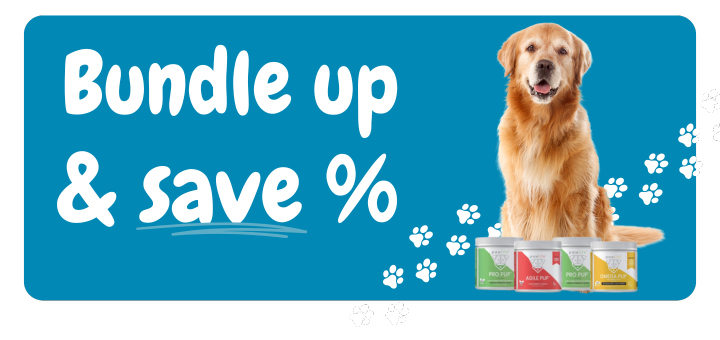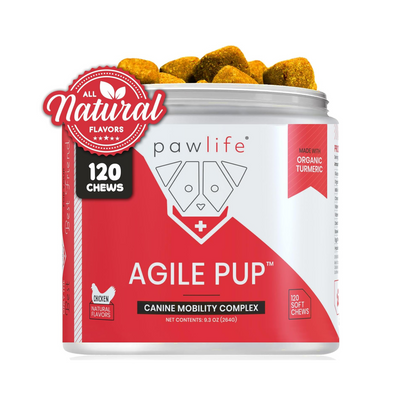Dog Joint Health: Signs, Prevention & Natural Support
Every dog parent loves seeing their pup sprint across the yard, leap into the car, or stretch out after a long nap. But over time — or sometimes earlier than expected — joint discomfort can limit those joyful moments. Just like humans, dogs rely on healthy cartilage, strong ligaments, and proper joint lubrication to move comfortably. Understanding the signs of joint stress, taking preventive steps, and offering natural nutritional support can help your dog stay active and pain-free for years to come.
At Pawlife, we’re passionate about keeping dogs moving with ease. Through vet-formulated supplements like Agile Pup and Comfort Move Duo, dog owners can protect and restore mobility in a safe, natural way. Let’s explore how joint health affects your pup and what you can do to support them at every stage of life.
Recognizing the Early Signs of Joint Issues
Dogs rarely complain — which makes it essential for owners to observe subtle changes. Joint pain develops gradually and can be easy to overlook until mobility declines. Watch for these early signs of discomfort:
- Limping or favoring one leg: This may come and go but often worsens after rest or play.
- Difficulty standing or lying down: Stiffness in the morning or after naps is one of the first red flags.
- Reluctance to jump or climb: Hesitation getting on furniture or into the car signals hip or knee strain.
- Reduced enthusiasm for walks: Dogs who suddenly slow down or avoid activity may be protecting sore joints.
- Visible stiffness or awkward gait: A “shuffling” walk or shortened stride often points to arthritis.
- Behavioral changes: Pain can cause irritability, restlessness, or decreased appetite.
Even mild signs deserve attention. Early intervention through joint supplements, balanced nutrition, and moderate activity can dramatically slow degeneration. For tips on spotting physical stress before it becomes serious, visit How to Recognize When Your Dog Needs a Mobility Supplement & How It Can Help.
Which Dogs Are Most at Risk?
While any breed can experience joint problems, certain dogs are genetically or physically predisposed. Large and giant breeds — such as Labrador Retrievers, Golden Retrievers, German Shepherds, and Rottweilers — often face early wear on hips and elbows due to their size. Working and sporting dogs also experience more repetitive motion and impact. Small breeds aren’t immune either: kneecap instability and ligament tears are common in toy breeds.
Age is another key factor. Puppies grow rapidly and need proper calcium and phosphorus balance for bone development. Middle-aged dogs may begin to lose cartilage elasticity, while seniors frequently experience arthritis or hip dysplasia. Overweight dogs face additional stress on every joint, amplifying pain and accelerating degeneration.
Preventive care is most effective when it begins early — ideally before signs appear. Starting your pup on a supplement like Agile Pup in adulthood can reduce long-term inflammation and support flexibility well into their golden years.
Everyday Prevention for Lifelong Mobility
While genetics play a role, lifestyle choices are equally important. Here are proven daily habits that protect joint health:
- Maintain a healthy weight: Every extra pound adds strain to knees, hips, and back joints. Balanced nutrition and portion control make a major difference.
- Incorporate low-impact exercise: Regular walking, swimming, and gentle play keep muscles strong without over-stressing joints.
- Provide orthopedic bedding: A supportive bed cushions pressure points, helping cartilage recover overnight.
- Minimize slippery surfaces: Rugs or mats prevent dangerous slips that can injure joints or ligaments.
- Schedule regular vet visits: Routine exams and mobility assessments help catch arthritis before it progresses.
- Stretch and massage: Gentle range-of-motion exercises improve circulation and flexibility — perfect after exercise.
Pair these habits with consistent nutritional support for the best long-term outcome. Read Daily Supplement Routines for Dogs: How to Keep Your Pup Healthy at Every Age for guidance on building an age-appropriate wellness plan.
The Science Behind Joint Supplements
Joint supplements work by delivering targeted nutrients that rebuild and protect connective tissue while reducing inflammation. Let’s break down the most effective ingredients and how they work together:
- Glucosamine: Supports cartilage formation and repair, providing a natural cushion for moving joints.
- Chondroitin: Attracts fluid into cartilage for shock absorption and flexibility.
- MSM (Methylsulfonylmethane): A powerful anti-inflammatory compound that reduces stiffness and promotes healing.
- Turmeric & Curcumin: Natural antioxidants that combat inflammation at the cellular level, easing chronic discomfort.
- Omega-3 Fatty Acids: Found in fish oils, they reduce inflammatory markers and improve joint lubrication.
- Hyaluronic Acid: Enhances the viscosity of joint fluid, ensuring smooth, cushioned motion.
Combined, these ingredients form the foundation of Pawlife’s Agile Pup Soft Chews — a vet-formulated joint support supplement that delivers results you can see and your dog can feel.
Natural Ways to Support Joint Comfort
Beyond supplements, you can use holistic strategies to complement your dog’s joint care. The goal is to create a balanced environment that reduces inflammation, maintains mobility, and strengthens the body overall.
Balanced Diet and Anti-Inflammatory Foods
Feeding your dog a diet rich in lean proteins, antioxidants, and omega-3s supports joint tissue regeneration. Ingredients like salmon, pumpkin, and sweet potato naturally provide anti-inflammatory benefits. Learn more about functional nutrition in Five Benefits of Pumpkin and Cinnamon for Dogs, where we discuss how everyday superfoods can improve your dog’s health from the inside out.
Weight Management and Movement
Obesity is one of the leading causes of joint degeneration in dogs. Even a 10 % weight reduction can ease joint pressure significantly. Combine healthy portioning with consistent low-impact exercise — daily walks, swimming, or short play sessions. Avoid repetitive jumping or rough landings that stress hips and elbows.
Complementary Therapies
Many holistic approaches can enhance joint comfort alongside supplements. Canine massage, hydrotherapy, acupuncture, and laser therapy all help reduce inflammation and restore range of motion. Always consult your veterinarian before beginning any new therapy, especially for senior dogs or those with chronic arthritis.
How Pawlife’s Agile Pup Supports Joint Health
Agile Pup soft chews combine the most effective natural joint-support ingredients — glucosamine, chondroitin, MSM, and turmeric — in a tasty, easy-to-give formula. Each chew helps to:
- Lubricate joints for smoother movement
- Rebuild cartilage and connective tissue
- Reduce swelling and oxidative stress
- Ease stiffness and improve flexibility
- Enhance recovery after exercise or play
Because the chews are naturally flavored with real chicken and contain no corn, soy, or artificial colors, dogs of all breeds and ages love them — making daily consistency effortless.

For dogs who experience tension or restlessness along with physical discomfort, the Comfort Move Duo pairs the same joint-supporting ingredients with natural calming botanicals like chamomile and valerian root — ideal for older pups needing both mobility and emotional balance.
Pairing Agile Pup with Other Pawlife Formulas
Joint health is part of whole-body wellness. For best results, combine Agile Pup with complementary Pawlife supplements:
- Pro Pup — probiotics for digestive balance that enhance nutrient absorption.
- Wild Alaskan Salmon Oil — pure omega-3 support for inflammation and coat health.
- Calm Pup — stress relief chews that prevent anxiety-related muscle tension.
Learn how these products work together in Calm & Comfortable: Natural Support for Dogs with Anxiety, Joint Stress & Everyday Wellness.
Building a Lifelong Mobility Plan
Joint health isn’t a one-time fix — it’s a lifelong commitment. Follow this framework to keep your dog’s body strong and flexible at every age:
| Life Stage | Goal | Recommended Support |
|---|---|---|
| Puppy (0–12 months) | Develop strong bones and cartilage | Multi Pup for complete vitamins + early glucosamine intake |
| Adult (1–7 years) | Maintain flexibility and reduce inflammation | Agile Pup + Omega Pup for active-dog joint protection |
| Senior (7+ years) | Relieve stiffness and preserve mobility | Comfort Move Duo for advanced joint + calming support |
Consistency delivers the best results. Administer chews daily, monitor movement and comfort levels, and adjust under veterinary guidance as your dog ages.
When to Seek Veterinary Guidance
Supplements and preventive care work best when paired with professional input. Schedule a vet visit if you notice persistent limping, swelling, or reluctance to bear weight. Diagnostic imaging (like X-rays) can identify underlying issues such as arthritis, ligament tears, or hip dysplasia. Your veterinarian can also recommend the ideal dosage and confirm that joint supplements fit safely into your dog’s routine.
Related Resources to Deepen Your Care Plan
- How to Recognize When Your Dog Needs a Mobility Supplement
- Digestive Wellness for Dogs
- Daily Supplement Routines for Dogs
- Five Benefits of Pumpkin and Cinnamon for Dogs
Final Thoughts: Give Your Dog the Gift of Movement
Your dog’s ability to move freely defines their independence, confidence, and joy. By learning the signs of joint discomfort, committing to preventive habits, and supporting your pup with natural supplements like Agile Pup, you’re doing more than easing pain — you’re preserving their spirit of play.
With patience, consistency, and the right nutrition, your dog can stay strong, agile, and ready for every adventure by your side.
👉 Explore Agile Pup and start your dog’s joint-care journey today.













